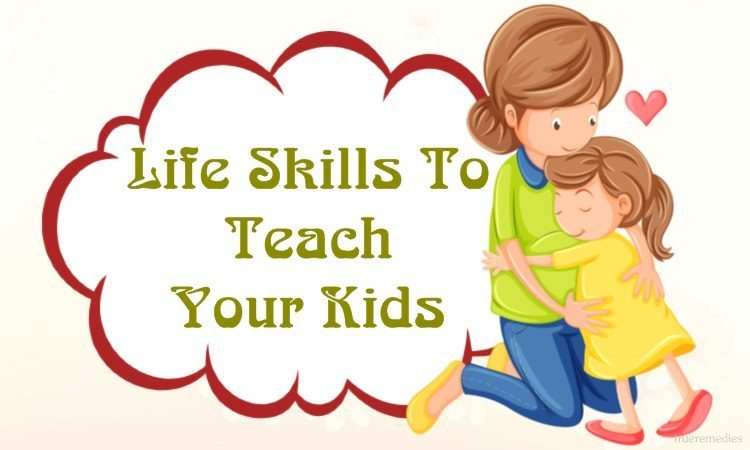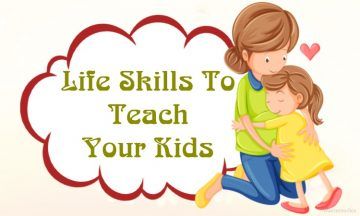Contents
All parents want to give their children the best, and training their life skills is an extremely important task, which decides the process of forming and developing their personality later. Today, TrueRemedies will show 20+ life skills to teach your kids 2 to 18 ages that parents need to know. Please practice these life skills for children as soon as possible!
I. What Are Life Skills?
Perhaps we have heard a lot about the words “life skills” and “life skills education for children”. But do you really understand what life skills are? In general, life skills are understood as the basic skills that people need to have a healthy, safe, and high-quality life.
There are different views on life skills. According to the United Nations Educational, Scientific and Cultural Organization (UNESCO), life skills are the ability of a person to perform functions and participate in daily life[1]. According to the World Health Organization (WHO), life skills include psychosocial skills and communication skills that are applied in daily situations to interact effectively with people and solve daily problems and situations effectively[2].
So, life skills help people change perceptions, attitudes, and values in positive and constructive actions. Therefore, kids need to be equipped with life skills to orientate their development best.
II. Why Should Teach Life Skills For Children?
Training life skills will help you quickly integrate with people and assert your position in a group, a community, or society. Therefore, no matter how talented or intelligent you are, but lacking life skills, you cannot access the surroundings and integrate and assert yourself as well.
So, training life skills for children is essential. The formation of basic skills in learning and activities is a decisive factor for the process of forming and developing children's personality later. When unexpected situations occur; if not equipped with life skills, children will not have enough knowledge to handle them. Therefore, training life skills will help children have a sense of self-control, live a positive life, and aim to healthy things for themselves and society.
TrueRemedies Partner Solutions

Need a Help from the Leading Expert Online, Available 24/7?
They’re all here and ready to answer your questions online or by phone. Keep asking questions until you get the answer you need.
III. When Should Parents Teach Life Skills For Their Children?
From the moment of birth, people have learned life skills. From the baby's first words, parents have taught their children some words such as hello, hi, yes, no, etc. That is the first communication skills that your children are trained. Growing up, when your children go to school, social relationships are expanded because, besides the family, they also get acquainted and interact with their friends and teachers.
This is the period when children need to practice basic skills to cope with unexpected issues in daily life. They need to be equipped with other necessary skills such as training and developing physical, self-awareness, identifying their strengths and weaknesses to improve their personality, or social skills such as communication skills, cooperation skills, teamwork skills, etc.. Therefore, if they are not well equipped with life skills, it will significantly affect their development.
Revealing life skills is different in each child as per detailed situations and ages. However, when they are at important ages like kindergarten, especially the period before entering first grade, they need to be equipped with life skills to help your children develop both physical and mental health comprehensively. Families and schools need to coordinate closely to teach basic life skills for children in a scientific and strategic way.
IV. Top 20+ Life Skills To Teach Your Kids 2 To 18 Ages
1. Ages 2 – 3
From ages 2 to 3 years, children begin to make significant strides in language development. Three years old is an important age marking the development of language skills, awareness, and social emotions. Here are the life skills to teach your kids 2-3 years old that parents should follow up to capture the development of their children.
At this age, children need to learn how to do simple personal tasks such as:
- Help put toys in place: Perhaps him do not know how to arrange toys properly after throwing toys around, but you should teach him the habit of picking toys and placing them in a prescribed position.
- Dress himself: Children at this age can choose the clothes they like and ask parents for helping them put on. Some more nimble children can wear and undress themselves. Also, they can prepare hats, coats, and masks when going out with their parents.
- Wash his face: You do not despise this simple task. Instead, learn how to wash your face and teach him how to wash his face properly. You also need to set an example for him to form this good habit.
- Brushing the teeth: Teach him to brush his teeth 2 times a day before going to bed and after waking up. You can find brushes with cute animal prints, and colorful toothpaste to attract him. Brush your teeth with your child so that he can learn how to brush and follow your examples.
- Self-feeding: A 2-year-old child can feed himself even though he is awkward about using a spoon. You should show the action very slowly so that he can feed himself, and wait patiently for them to eat. If he does not like to eat anymore, you should not be forced.
- Wipe the table and pick up garbage in the right place: When your child eats, if food drops on the table, you can instruct him to clean the table. Gradually, he will develop a habit of being careful when eating and cleaning the table if spilled. Or garbage, you can instruct him to put his own diapers in the trash if he is still wearing diapers. Thus, he will form a clean habit and always pick up and put waste in the right place, making the space around him cleaner.
- Teach your kid to go to the toilet: You should let him know how to go to the toilet on time and flush after using the toilet. Also, you should keep the potty in a certain position in the house, which helps him to take the initiative in going to the toilet. Or, you can prepare a toilet seat for babies to train him to go to the toilet like an adult.
- Teaching your child how is respectful: 2-year-old children like to imitate, so you should take advantage of this point to teach life skills for your child. When someone hails or gives something to him, you need to teach him how to say, “Oh, yes!”, accompanied by the act of folding his arms or bowing.
- Teach him to say “thanks or apologize”: When he is concerned by adults and friends, or when he bothers other people, remember to teach him to say “Thank you!” and “sorry”.
- Teach him how to share: You need to teach him how to play with toys when he plays with one or more friends. Also, you need to teach him to give toys and return toys after borrowing them from his friends.
- Teach him to develop a serious attitude during meals: Meals are one of the factors for expressing family cultures. Therefore, you should guide him to invite adults, not to poke the spoon or chopsticks around, not to spill food, and not to disturb others during meals. 2-year-old children are quite active, and you need to guide your children to concentrate on meals and not to play or talk while eating.
- Encourage self-esteem in your child: “Self-esteem, or learning to appreciate your own value, starts forming early in life, and is of the most important things a parent can help their child to learn. How? By praising their children so they learn to value their achievements.”[3] (Medically reviewed by Sarah Brewer MSc , MA (Cantab), MB, BChir, RNutr, MBANT, CNHC.)
2. Ages 4 – 5
Your kid is not little anymore! he has learned to walk and run, sing songs, tell stories, and even recognize numbers and letters. Now there are a lot of new things to learn. You can start to teach him with the essentials, especially if your child is starting in kindergarten. You can refer some of the life skills to teach your kids 4 to 5 years old below:
- Know parent's full names: It is time to teach him to remember his name and parent's names. Although it is a more difficult task, you should try and see if he can remember your phone numbers, home phone numbers, and family addresses. In the worst case, he strays from his family, he knows how to ask someone else for finding his parents. However, you should teach him to avoid giving strangers information about his family.
- Teach self-sufficiency skills: You should teach him to tie his shoelaces, wipe his nose, use eating utensils correctly, and push the straw through his milk box. Although adults like the preschool teacher are still around to help him, learning how to do several things on his own help foster his independence and self-confidence.
- Teach him how to sit still: Now there are more and more kids who can't focus and stay put. It is a problem caused due to excessive gadget use. If he already had much screen time, he hardly sits down, cannot finish coloring or a puzzle, or do not share because he cannot wait for his turn. According to Dr. Ma. Theresa Arranz-Lim, developmental and behavioral pediatrician, a child 4 years old should stay put for 15 to 20 minutes when forced to sit down. See if your kid can accomplish this task and practice his capacity of sitting still by playing dissimulated school at home.
- Teach him how to get along with other kids: You should teach him to know how to take turns and share with other kids. Also, with folk games, sports, and even games that teach life skills, if done with others, your child will find it extremely attractive. You should create conditions for him to play with his friends around the neighborhood.
- Teach him safety rules when going on the street: Have you ever taught him about road safety? He always crosses with you or a grown-up but now it is time to show him how he crosses at pedestrian crossings and he looks both ways and listens to cars when he does so. He shouldn't be allowed to pass without an adult, but it is better to be well prepared.
- Swimming: Swimming is not only an important skill but also increases the child's ability to cope with drowning cases. Your child needs to learn how to swim for beginners.
3. Ages 6 – 7
These 5 life skills are essential for children 6 to 7 years old. You should take advantage of each step to cultivate these skills to create a good moral foundation for children.
- Civilized gestures: Civilized gestures are one of the basic requirements of people living in modern society. Therefore, children need to know a minimum number of gestures such as indiscriminate spitting, urinating in the wrong place, causing noise in public places, queuing for his turns, obeying traffic laws, etc. To train your baby to develop civilized behaviors, you should observe his reactions when facing specific situations for a while. From there, you will have timely explanations and instructions for your baby.
- Teach your children how to show gratitude: You need to teach your child lessons of gratitude and respect for what he has even though it is not the latest and most valuable item. You can start with simple stories like showing him how lucky he is when having warm clothes in the winter, having toys, and having grandparents to take care of him every day. Teach him how to express gratitude from an early age so that he appreciates what he has when he grows up.
- Learning and playing on a schedule: The habit of arranging work sequentially can enhance his self-awareness and efficiency of learning and work. But it is really hard for your child to study on time because he prefers playing around to studying. The best way for your child to gradually eliminate this bad habit is that you actively remind him about things to do with a set amount of time; for example, “five more minutes, you need to go to school”, “Watch TV 10 more minutes and then go to sleep! ” This gives your kid a certain amount of time to prepare mentally.
- 6-year-old children should know how to manage personal expenses: If you teach your child how to manage personal expenses from an early age, he will know how to be financially independent when being a grown-up. You need to have a good method to educate and analyze him to save money and use money wisely.
- Teach your child how to prevent abuse: Life skills to teach your kids 6 years old also needs to include teaching him how to protect himself and detect bad people. You need to teach him the Underwear Rule; anyone who touches his body in the underwear area is a bad person. At that time, he needs to know to escape and tell his parents. Also, you need to trust your child.
4. Ages 8 To 9
Many parents do everything for their children instead of letting them protect themselves. This adversely affects their children. Here are life skills to teach your kids 8 – 9 years old.
- Wash clothes: Too many young people who go to college still don't know how to wash clothes. Don't let your child be one of them. You can start teaching laundry skills when he is 8-9 years old. If a washing machine is available, place a chair nearby and guide the process, including how to measure, add washing powder, choose the setting, and start the machine.
- Teach your child about money: You can ask him to list what items he bought by money that is given and then calculate the total cost. After that, you recommend using the remaining money as savings. In addition, you should have him make a list of things he wants to buy and explain to him that he can only buy them when he saves enough money. In this way, you will give him an understanding of money, ways to save money, and ways to not waste money.
- Teach your child to cook simple dishes: You can teach him to live independently by guiding him to cook by themselves. If he knows how to cook simple dishes from an early age; when he grows up, he will be able to cook daily meals without his parent nearby. It is important that in addition to cooking skills, you need to teach him how to use kitchen utensils and avoid sharp objects.
5. Ages 10 To 13
During this period, you need to know what skills are needed to support your child to learn and maximize his abilities.
- Read maps: In the near future, your child will be able to roam the streets on his own. Therefore, teach him how to use the navigation tools and how to read maps. Before age 13, he should be able to remember directions, read symbols on a map, and orient himself. There are many resources on the internet to help make reading maps more enjoyable.
- Control emotions: Not only teens but many adults also lack the ability to accept and control emotions, such as anger, stress, and anxiety. Emotion regulation skills include the ability to identify emotions, understand situations, manage emotions, and seek help when needed. Recognizing that feeling sad is not a sign of weakness and that emotions can help when dealing with situations will help your child a lot in life later.
- Reflective ability: The child's reflective ability is not only expressed through physical activities but also through interactive games. In order to practice reflective ability for him, you should let him play a lot of physical activities and create opportunities for him to handle situations when they suddenly face obstacles on the move, which helps him to limit future injuries.
6. Ages 14 To 18
Your 14-year-old kid should have mastered all of the life skills above. On top of that, he should have the ability to:
- Do more complicated cleaning chores, such as flushing after using the toilet, unclogging drains, cleaning the stove, etc.
- Fill up a car and add air to the tires and change them
- Interview to get a job.
- Create a calendar
18 is perhaps the most beautiful age of life, a symbol of strength and enthusiasm with so many ambitious dreams and the long road ahead. So, what have you prepared for your child before the threshold of his life?
- Be able to talk to strangers easily and confidently: The strangers here are not anyone he meets on the street but rather the bankers, office workers, policemen, repairmen, etc.
- How to express grievances: Teach your child to know how to express dissatisfaction before wrong things properly. And the important thing is that you should teach him to express his opinion effectively so that you can improve situations, not just ‘I'm just saying’.
- Your child should have enough essential life skills to find a job, even if it is only a part-time job: He should know how to start, how to write a resume, and how to apply for a job and how to answer the interview questions?
- Teach your child how to choose appropriate outfits: Although wearing torn jeans and slippers is okay for babysitting jobs, such dressings may not be appropriate for summer law practice at a law firm.
- Know basic survival skills: Know how to swim, learn first aid, handle in emergencies like a fire.
- Know how to return an order if something goes wrong, whether it's a restaurant dish or an online order. Nobody will get angry at him. And if they do, it's their problem, not his. He has the right to what you pay for.
- Skills of traveling by public transport: Your child can use Global Positioning Device (GPS) to navigate while driving or hiking. On the other hand, he needs to know how to use public transport.
- Know how to find information on the Internet quickly. Snapchat and Tumblr don't help when your child has a problem on the road. Knowing how to look up essential information on the Internet is not only a skill for doing homework at school but it is also one of the most important skills your child should have in this digital age.
- Responsible for completing the task. You aren't always present to remind him. A boss or professor may want him to succeed but they will never invest in his future like the way you do. Your child must be responsible for himself.
Above are basic life skills to teach your kids 2 to 18 ages that parents need to know. Give your baby the best things to his life! For reading other useful and informative articles on our site, visit our main Parenting to read more.









